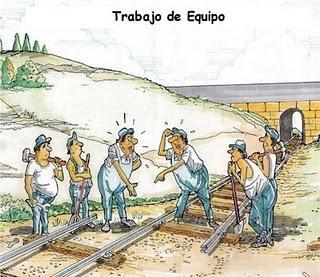 Hace algunas semanas escribíamos un post titulado: ¿Está la humildad sobrevalorada?; y comento esto porque el otro día en la Harvard Business Review, Jeff Stibel (@stibel), Chairman and CEO of Dun and Bradstreet Credibility Corp y autor de Wired for Thought: How the Brain Is Shaping the Future of the Internet, escribía el siguiente artículo: Why a Great Individual Is Better Than a Good Team?; que traducido de manera coloquial podría ser: ¿Está el trabajo en equipo sobrevalorado?
Hace algunas semanas escribíamos un post titulado: ¿Está la humildad sobrevalorada?; y comento esto porque el otro día en la Harvard Business Review, Jeff Stibel (@stibel), Chairman and CEO of Dun and Bradstreet Credibility Corp y autor de Wired for Thought: How the Brain Is Shaping the Future of the Internet, escribía el siguiente artículo: Why a Great Individual Is Better Than a Good Team?; que traducido de manera coloquial podría ser: ¿Está el trabajo en equipo sobrevalorado?Lo reproduzco (en inglés) y luego comento:
Anytime a CEO, quarterback, engineer or author is paid ridiculous amounts of money, dozens of investors, armchair quarterbacks, and scholars jump in to debate the value of individual contributors versus teams. Bill Taylor wrote the most recent of many interesting pieces, where he argued provocatively that "great people are overrated," in response to Facebook CEO Mark Zuckerberg's comment that a great engineer is worth 100 average engineers.
I have heard plenty of people argue that no one individual is worth the price of many. But interestingly, I have never heard it from a leader.
As a CEO, I have run public companies, private companies, startups, turnarounds, and divestitures — in each and every case, I have never seen a situation where quantity is better than quality when it comes to people. Never. Great people are both hard to find and worth an infinite number of average people.
And as a brain scientist, I know that great individuals are not only more valuable than legions of mediocrity, they are often more valuable than groups that include great individuals. Here's why:
The truth is, our brains work very well individually but tend to break down in groups. This is why we have individual decision makers in business (and why paradoxically we have group decisions in government). Programmers are exponentially faster when coding as individuals; designers do their best work alone; artists rarely collaborate and when they do, it rarely goes well. There are exceptions to every rule, but in general this holds true.
There is clearly not widespread acknowledgment about the benefits of individual contributors — in many ways, it goes against our inclination towards equality. And thank goodness, because that gives those of us who understand the real value of great people a huge competitive advantage! But for anyone interested in making better decisions about their teams, it is worth spending some time understanding the science behind individual greatness.
In many ways, individual people follow an inverse rule relative to networks of people. Consider the two fundamental laws of networks: both Metcalfe's Law and Reed's Law assume that as a network of people grows, the value of the network increases substantially. (In Metcalfe's Law, the value of the network is proportional to the square of the number of people in the network, whereas Reed's Law demonstrates that the value for any individual within a network grows exponentially with every new member.) But with individuals, the opposite is true: The value of a contributor decreases disproportionately with each additional person contributing to a single project, idea, or innovation.
This is true across all areas but only so far as there are discrete pieces of work to be done. To be sure, there is clear value in having a marketing person work with a programmer on a project or a biologist working with a chemist on a problem. Proper team building is a powerful thing. But when an activity can be performed sufficiently by one person with adequate skills, doing the activity as a group should be avoided.
The concept of declining incremental value is essentially a "power function" or, more technically, a scale invariance — where the greatest impact comes from the smallest proportion of the population. There are numerous examples of power functions, including Stevens' law, Keplar's law, the long tail, Zipf's law, and the Pareto principle (or 80/20 rule). And power laws explain plenty of events in nature (i.e., earthquakes), finance (i.e., income distribution), language (word frequency), and even ecommerce (i.e., book sales on Amazon). Virtually all complex systems follow power laws within the system itself.
Here's how power functions relate to the brain. As described in my book Wired for Thought, the brain is a complex network of neurons. There are around 100 billion neurons connected to one another in the brain and they follow a network law — the value of a neuron is exponentially more valuable as the overall neural network grows. But when the brain becomes highly active, it reverts to a power law where a spike in activity is followed by a lull. Informally called neuronal avalanches, these spikes have been linked to knowledge transfer and storage, communication, and computational power — in short, intelligence.
The same is true when it comes to people. Our intelligence is incredibly complex and as a result, a great individual can far exceed the value of many mediocre minds. This is why it is absurd to ask questions like "how many mediocre people would it take to collectively beat Kasparov in a chess match?"
Mediocre minds can also destroy the value or contribution of a great mind. No matter how good Kasparov is at chess, he would not do well playing doubles with a mediocre chess player against Bobby Fisher alone. Or take Michelangelo's David as an example. A second artist cutting into David would cause massive destruction to the sculpture, even if that artist was Picasso. With each successive stroke of the chisel from additional artists, David's value, beauty, and overall impact would diminish. A perfect — albeit destructive — example of a power function.
Leaders need to make tough decisions all the time. One decision is easy: find the best people and empower them to do great things.
Comparto lo que dice Jeff Stibel (@stibel); sin embargo, creo que hay que precisar que el trabajo en equipo a lo que se refiere (uno de sus 3 aspectos clave como se recoge en el Capítulo 10. Tú eres muchas personas de Fast Good Management) es la Complementariedad. Puedes tener una great mind en una parcela que sea mejor que muchas mediocridades juntas; pero esa great mind necesita de otras great minds en otras áreas. Cada uno sabemos de lo que sabemos. Como hemos dicho muchas veces: con el traje de llanero solitario, las posibilidades de éxito son siempre limitadas. O como dice un proverbio africano: "Si quieres ir rápido, ve solo; si quieres llegar lejos, ve con otros". Ned Hermann en The whole brain business book (1996) escribe: "Nadie puede silbar una sinfonía. Es necesaria una orquesta para tocarla".
* Hoy en Libros de Management (@librosdemanagem) otras 10 novedades editoriales interesantes.






